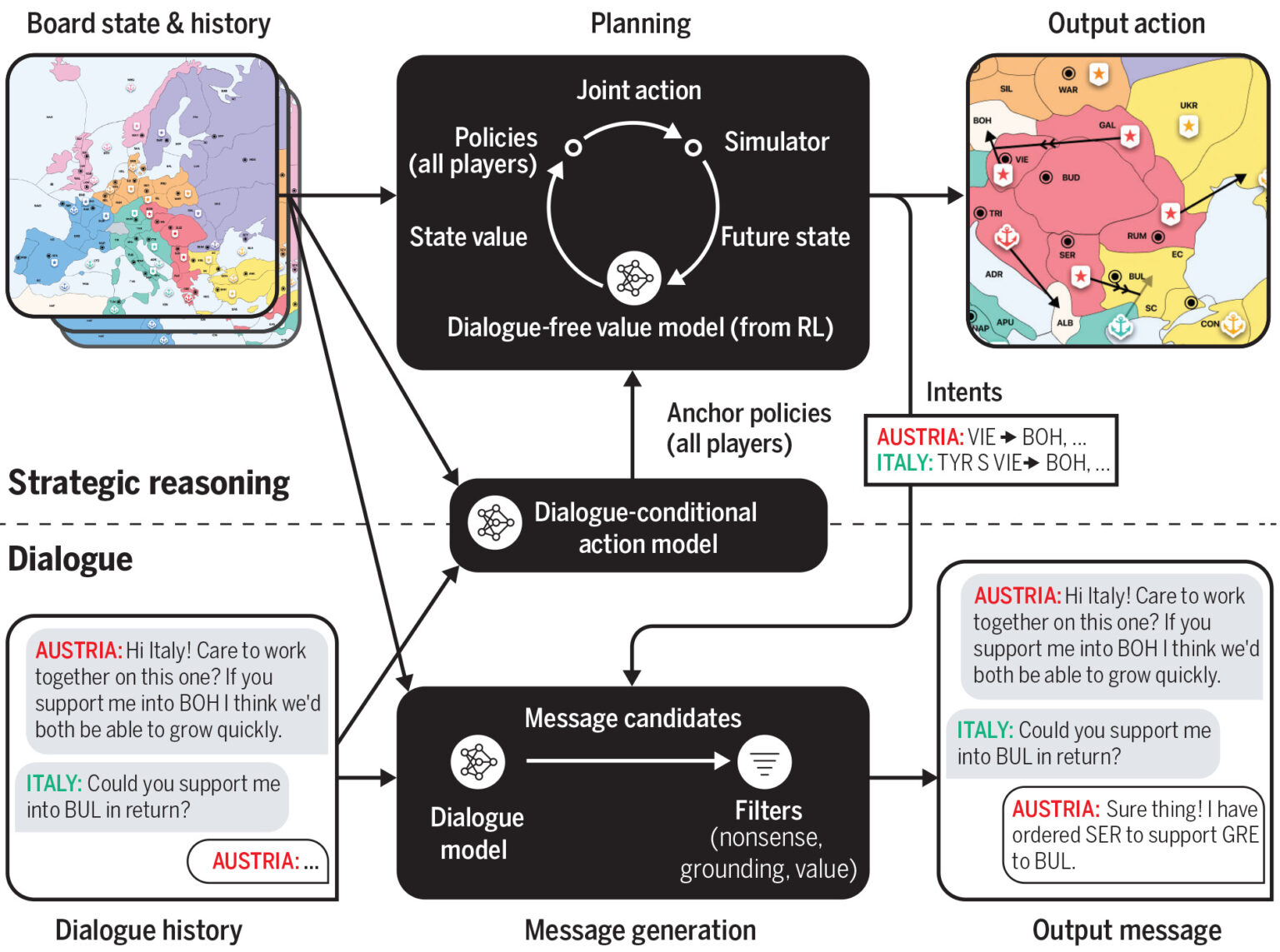Negotiation
YouTube ... Quora ...Google search ...Google News ...Bing News
- Agents ... Robotic Process Automation ... Assistants ... Personal Companions ... Productivity ... Email ... Negotiation ... LangChain
- Debating
- Gaming ... Game-Based Learning (GBL) ... Security ... Generative AI ... Games - Metaverse ... Quantum ... Game Theory ... Design
- Theory of mind (ToM)
- Risk, Compliance and Regulation ... Ethics ... Privacy ... Law ... AI Governance ... AI Verification and Validation
- Telecommunications ... Computer Networks ... 5G ... Satellite Communications ... Quantum Communications ... Communication Agents ... Smart Cities ... Digital Twin ... Internet of Things (IoT)
- Policy ... Policy vs Plan ... Constitutional AI ... Trust Region Policy Optimization (TRPO) ... Policy Gradient (PG) ... Proximal Policy Optimization (PPO)
- Large Language Model (LLM) ... Natural Language Processing (NLP) ...Generation ... Classification ... Understanding ... Translation ... Tools & Services
- Conversational AI ... ChatGPT | OpenAI ... Bing/Copilot | Microsoft ... Gemini | Google ... Claude | Anthropic ... Perplexity ... You ... phind ... Ernie | Baidu
- How artificial intelligence could negotiate better deals for humans | Matthew Hutson - Science
- Negotiation and honesty in artificial intelligence methods for the board game of Diplomacy | J. Kramár, T. Eccles, I. Gemp, A. Tacchetti, K. McKee, M. Malinowski, T. Graepel & Y. Bachrach - Nature Communications
- Companies Are Adopting AI For Supplier Negotiations, But Which Ones Should The Machines Handle? | Martin Rand - Forbes
- The Contract Negotiation Process Streamlined by AI - Gary Sangha - LexCheck
- AI enabled Negotiations: Are we on board yet? | Kiran Huthanahalli Manjunath - Infosys BPM
- One of the most popular approaches to AI negotiation is based on Game Theory. This involves modeling negotiations as strategic interactions between two or more agents, and using mathematical models to determine optimal negotiation strategies. These models can be used to develop negotiation algorithms that can help agents reach mutually beneficial outcomes.
- Another approach to AI negotiation involves using machine learning techniques to analyze large datasets of negotiation data, and to identify patterns and trends that can be used to improve negotiation outcomes. This approach can be particularly useful in complex negotiations where there are many variables and factors to consider.
- In addition to these approaches, there is also ongoing research into natural language processing and other techniques that can help to improve the ability of AI systems to understand and respond to human communication in negotiation settings.
Meta
- Cicero from meta may foreshadow hybrid AI future architectures | Ajit Jaokar - Data Science Central
- DeepMind vs CICERO: How Meta Defeated Alphabet at its Own Game | Anirudh Vk - AIM
“An agent that can play at the level of humans in a game as strategically complex as Diplomacy is a true breakthrough for cooperative AI.” - Yann LeCun
Meta's CICERO, an AI model designed for negotiation and strategic reasoning, combines game-theoretic strategizing with natural language technology developed for linguistic tasks. It is capable of achieving top-human performance in the game of Diplomacy, a complex strategy game involving negotiation, cooperation, and competition. The technology behind CICERO is relevant to many other applications beyond gameplay, such as long-term conversation and teaching skills, and it marks a new era for AI that can collaborate with people using strategic reasoning and natural language processing.
The architecture and technology used in CICERO involve extensive use of machine learning, but it is not simply about making ever bigger models or following the currently popular view of end-to-end machine learning. Instead, it combines game-theoretic strategizing with natural language technology developed for purely linguistic tasks. This combination allows CICERO to engage and compete with people in gameplay using strategic reasoning and natural language, marking a significant advancement in human-AI interactions.
CICERO's ability to engage in natural language dialog in relation to its planning abilities is significant, as it achieved human-level performance in Diplomacy, emphasizing natural language negotiation between players. This ability has the potential to benefit the development of other planning systems and AI technologies in the future, particularly in the intersection of natural language processing and strategic reasoning.
Cicero couples a dialogue module with a strategic reasoning engine. Each turn, CICERO models the other players’ policies based on the game state and shared dialogue. It forms a plan, and the dialogue module generates messages conditional on the plan. Diplomacy is a game whose main element is negotiation. For this reason, in order for AI to play Diplomacy and win, ``talk with other players without discomfort and call for cooperation, ``interpret strategies from other players' negotiations, ``see other players' lies and It is necessary to perform difficult processing for existing AI, such as 'laying a lie to the player of'. In order to solve these problems, Meta uses both 'strategic reasoning' used in the strongest Go AI 'AlphaGo' and 'natural language processing' used in sentence generation AI 'GPT-3'. Meta develops AI ` Cicero ' that manipulates ` lies ' to deceive humans and bites into the top 10% of the friendship destruction game ` Diplomacy ' | Maxime Bonzi - Gigazine


Meta's new AI can beat human players at Diplomacy | Matt Cox - Rock Paper Shotgun ... It never "intentionally" lies
Google DeepMind
- AI for the board game Diplomacy | DeepMind
- GitHub Google Diplomacy
- Learning to Play No-Press Diplomacy with Best Response Policy Iteration | T. Anthony, T. Eccles, A. Tacchetti, J. Kramár, I. Gemp, T. Hudson, N. Porcel, M. Lanctot, J. Pérolat, R. Everett, R. Werpachowski, S. Singh, T. Graepel & Y. Bachrach - Deepmind
- Negotiation and honesty in artificial intelligence methods for the board game of Diplomacy | J. Kramár, T. Eccles, I. Gemp, A. Tacchetti, K. McKee, M. Malinowski, T. Graepel & Y. Bachrach - Nature Communications DeepMind